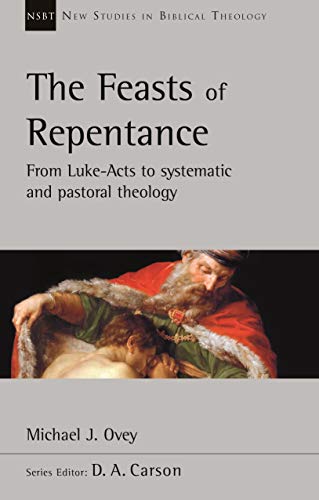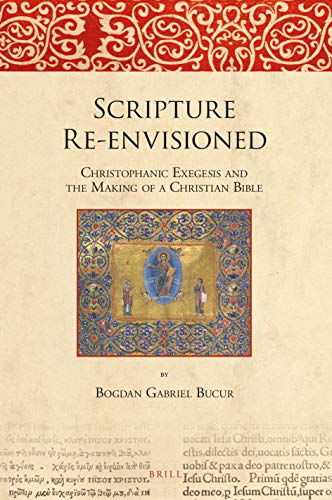The Feasts of Repentance: From Luke-Acts to Systematic and Pastoral Theology
Written by Michael J. Ovey Reviewed By Brian J. TabbMike Ovey’s name is well-known to Themelios readers. Mike Ovey was principal of Oak Hill College in London and served as consulting editor of Themelios from 2012 until his sudden death in 2017 at the age of 58. Those unfamiliar with Dr. Ovey’s life and contribution should read Dan Strange’s moving article, “‘Just Mike’: A Tribute to Mike Ovey (1958–2017),” Themelios 42.1 (2017): 13–15. The Feasts of Repentance represents a revision of Ovey’s 2008 lectures at Moore College. The manuscript was nearly finished at the time of Ovey’s sudden death, and Moore’s principal Mark Thompson undertook the “minor editorial work” needed to bring this book to press (p. viii).
Thompson aptly writes in the Preface, “Mike was a biblical and systematic theologian with a deep pastoral concern…. He was never satisfied with an abstract theological system. Nor was he satisfied with a theology that remained detached from the context in which it is lived out and proclaimed” (p. viii). Ovey displayed a rare blend of theological excellence, pastoral sensitivity, and penetrating cultural engagement in his many Themelios columns. This new book offers more of the same.
Ovey declares at the outset that those in the cultural West live in “a time of repentanceless Christianity” (p. 1), a reality that forces us to examine the place of repentance in our evangelism and in our expectations for the Christian life. Ovey chooses to focus attention on Luke and Acts, though he briefly addresses the wider NT picture of repentance in the book’s “Concluding Reflections” (pp. 155–56). He does not restrict his study to the usage of μετανοέω and μετάνοια, acknowledging the “substantial overlap” between the usage of “turning” and “repentance” (p. 2). Ovey throughout shows sensitivity to the narrative dynamics of Luke-Acts (with frequent citations of Robert Tannehill) and explains that the evangelist “does not so much discuss repentance, the theological locus, as people: people who are, and who are not, repentant” (p. 5). Thus, Ovey compares and contrasts the repentant and unrepentant characters in Luke’s Gospel (ch. 2), then in Acts (ch. 3).
Chapter 2 reveals the rationale for the book’s title, as Ovey focuses attention on feasts and meals as “type scenes” that reinforce key values for Luke’s readers (p. 12). In these scenes, the “repentant” characters—typically tax collectors and sinners—demonstrate humility, remorse over sin, and acknowledgement of guilt, as well as joy, celebration, and trust in Jesus. Conversely, the Pharisees headline the “unrepentant” character group; they idolize wealth and power (just like the tax collectors) and are proud, self-reliant hypocrites who lack true love for God or neighbour and are dangerously unaware of their true condition. “In all this, repentance becomes something that locates us relationally with respect to Jesus and God and others” (p. 34). Ovey’s pastoral concern is evident as he presses readers to consider with which character group they identify.
In ch. 3, Ovey turns his attention to Acts, where repentance is proclaimed for Jews and Gentiles alike. He explains that the unrepentant are characterized fundamentally as proud, self-justifying, and self-deceived. In a brief digression, Ovey urges NT scholars not to accept uncritically Judaism’s self-description but to recognize that “the Judaism one may read on the page … is not the same as the belief in the heart of a first-century Jew…. [Q]uite simply, people are self-deceived” (p. 37).
In ch. 4, Ovey argues that repentance is not “moralism” but a turning from idolatry. Idolatry tells a double lie about God and self, while repentance entails a double “recognition” of God’s and our true identity. Ovey offers a wide-ranging, penetrating treatment of idolatry as (1) parody, (2) lie, (3) the sin, (4) worldview, (5) narrative, (6) addiction, and (7) a false identity.
The next chapter considers the relationship of repentance to faith in the order of salvation. Ovey affirms John Murray’s observation that penitent faith and faithful repentance belong together. He thus rejects a contemporary therapeutic, intellectual approach to repentance while also critiquing Karl Barth’s view that Christ repents representatively as our head. Repentance does not merely acknowledge Christ as Lord, it also “locates” us relationally to Christ.
In the book’s final chapter, Ovey turns to matters of pastoral theology. He builds on Miroslav Volf’s insight that the gospel shapes repentance and leads to transformation and applies this to the Episcopal Church’s notion of “inclusion” in the church that renders repentance and faith irrelevant. “The basis of inclusion in God’s realm and in the forgiveness of sins is repentance and faith” (p. 138), which depend not on human merit or “rights” but on God’s grace and mercy. When we grasp that our salvation depends on God’s undeserved gift, this leads us to “imitate God’s actions towards one another” (p. 153).
Some readers may be disappointed that Ovey chose not to engage with scholarship published after he delivered his 2008 Moore lectures, including Richard Lints’s highly relevant book in the same series (Identity and Idolatry: The Image of God and Its Inversion [Nottingham: Apollos, 2015]) and important Acts commentaries by David Peterson, Eckhard Schnabel, Craig Keener, and Daniel Marguerat. While these omissions make Ovey’s work feel a tad dated in 2019, his deep familiarity with the church fathers, the Puritans, and influential Reformed theologians from past centuries chastens us for what C. S. Lewis called “chronological snobbery, the uncritical acceptance of the intellectual climate common to our own age and the assumption that whatever has gone out of date is on that account discredited” (Surprised by Joy: The Shape of My Early Life [New York: Harvest, 1955], 207). By retrieving Tertullian, Augustine, Calvin, Watson, Chesterton, Murray, Barth, and others, Ovey reminds us that newer is not necessarily truer and offers necessary correctives to the repentanceless Christianity of the present.
The Feasts of Repentance is a unique contribution to the New Studies in Biblical Theology series, as Ovey does not stay in the lane of biblical theology but veers deliberately into systematic and pastoral theology (in this way, his work has affinities to Mark Thompson’s A Clear and Present Word: The Clarity of Scripture, NSBT 21 [Downers Grove, IL: InterVarsity Press, 2006]). Ovey here offers theology students and pastors an exemplary model of careful exegesis that leads to faithful doctrinal synthesis and penetrating application. His signature contributions include his stress on the joy and feasting that characterizes repentant people, the close linkage of repentance to idolatry and identity, and his explanation of repentance as relocation. This rich book reminds me of how much we miss Mike Ovey and how grateful I am for his life and scholarship.
Brian J. Tabb
Brian Tabb is interim president, academic dean, and professor of biblical studies at Bethlehem College and Seminary in Minneapolis and general editor of Themelios.
Other Articles in this Issue
What are we to make of Cultural Marxism? This article seeks to answer that question, first, by outlining the key elements and legacy of classical Marxism; second, by exploring the neo-Marxism of Antonio Gramsci; third, by assessing the main ideas and impact of “the Frankfurt School”; and, fourth, by offering some reflections on (i) the links between these thinkers and various contemporary developments, (ii) the wisdom of employing the term Cultural Marxism, and (iii) how Christians should respond to the current “culture wars” that are polarizing the Western world.
The diverse essays in Stanley Rosenberg’s edited volume Finding Ourselves After Darwin: Conversations on the Image of God, Original Sin, and the Problem of Evil (Grand Rapids: Baker Academic, 2018) offer a Christian analysis of the human person in light of evolutionary thinking...
Do Formal Equivalent Translations Reflect a Higher View of Plenary, Verbal Inspiration?
by William D. MounceThe article begins by establishing five categories of translation theory and argues that functional translations like the NIV do in fact reflect the meaning of every Greek word, but not in the same way as formal equivalent translations do...






